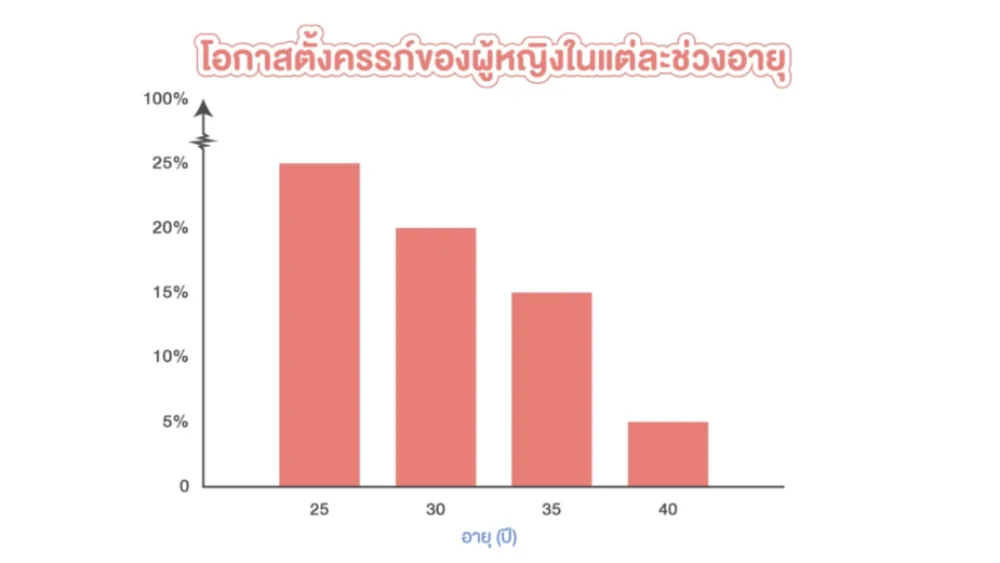Age is considered one of the key factors commonly used to assess fertility. According to medical principles, if someone is aged 35 or older, the question of whether they can still have children often leads to them being categorized as having infertility issues. In addition to increased difficulty in conceiving, advancing age also brings a higher risk of complications during pregnancy. Therefore, having a child after the age of 40 should be done under medical supervision.
It has been found that fertility starts to decline after the age of 35, as the ovaries are most fertile between the ages of 20 and 35. If conceiving at 35 is already challenging, it becomes even more difficult at 40. However, that does not mean it is entirely impossible. We can evaluate whether a woman at the age of 40 is still suitable for conception or infertility treatment by checking hormone levels through a blood test.
If the baseline hormones are still within a normal range—typically measured on the second or third day of menstruation—and if the results show that the ovaries can still produce eggs, then regardless of age, it is possible to stimulate the ovaries and retrieve eggs for in vitro fertilization (IVF).
The ideal age range for having children and the chances of pregnancy at each age group.
The optimal reproductive age for women to have children is between 20 and 27 years old. During this period, the eggs are at their healthiest, and the body is in a strong condition suitable for pregnancy. The chances of conceiving are higher, and the risk of complications for the baby is relatively low.
One effective way to help prevent infertility is egg freezing. You can read more about this in the article "What is Egg Freezing? Procedures and Doctor’s Recommendations."
The quality of eggs naturally declines with age, as ovarian function deteriorates over time. At age 40, the eggs may be of lower quality, and even if fertilization occurs, the resulting embryos may have genetic abnormalities. This is a known possibility. However, once the eggs are fertilized with sperm and developed into embryos, we can test them beforehand to check for any abnormalities. If abnormalities are found, we will not transfer those embryos into the uterus.
Therefore, even at age 40, as long as hormone levels are still good and the ovaries can still produce eggs, there is still a chance of conceiving or undergoing fertility treatment. However, it is certainly more difficult compared to younger women.
How can you tell if you're still able to have children?
There are two main ways to assess whether a woman is still able to have children:
1. Menstrual Cycle
If a woman is still having regular periods, it is generally a good sign that her body is still capable of conceiving. While it's not a 100% guarantee—since many complex factors are involved in pregnancy, such as the quality of the eggs, hormonal balance, and even the male partner’s fertility—it can be considered a basic indicator. Simply put, if you are still menstruating, you likely still have the potential to conceive.
2. AMH Hormone Test
Anti-Mullerian Hormone (AMH) is produced by the follicles in a woman’s ovaries. It reflects both the quantity of remaining eggs and the overall function of the ovaries, making it a useful indicator of fertility potential.
-
High AMH levels suggest a larger reserve of eggs and a higher likelihood of conception. AMH levels naturally decline with age, but if a woman has high AMH despite being older, it indicates that her egg reserve is still relatively good.
-
Low AMH levels indicate a diminished egg reserve. This could be a cause for concern, and medical advice or fertility treatment may be recommended.
Reference Range for AMH Levels by Age (Vidas AMH Reference Values):
-
18–24 years: 2.15 – 8.40 ng/mL
-
25–29 years: 1.20 – 8.76 ng/mL
-
30–34 years: 0.80 – 7.00 ng/mL
-
35–39 years: 0.11 – 5.15 ng/mL
-
40–44 years: 0.10 – 3.84 ng/mL

What are the benefits of an AMH test and what can it tell you?
Benefits of AMH Testing: What Can It Tell You?
-
It helps doctors assess the number of eggs in a woman’s ovaries, which can indicate the likelihood of success with assisted reproductive technologies (ART).
-
It allows doctors to evaluate ovarian function and determine the appropriate dosage of medication needed for ovarian stimulation.
-
It assists doctors in advising women on the best ways to increase their chances of conception.
-
It helps estimate the appropriate timeframe for pregnancy planning, especially for women in their 30s.
-
It can be used to assess the presence of Polycystic Ovary Syndrome (PCOS), a condition that can cause infertility.
-
It helps evaluate the risk of Premature Ovarian Insufficiency (POI), a condition in which the ovaries stop functioning earlier than expected and can lead to early infertility.
Learn more:
-
Polycystic Ovary Syndrome (PCOS)
-
Premature Ovarian Insufficiency (POI)
Disadvantages of AMH Testing:
-
The test can be relatively expensive.
-
It is not yet available at all hospitals or clinics.
Risks of Pregnancy at Age 40 and Beyond:
Complications for pregnant women over 40 can be divided into two main areas: the mother's health and the health of the baby. As age increases, so does the risk of developing health issues such as high blood pressure and diabetes, which are common in individuals over 40. These conditions can lead to serious complications such as:
-
Preeclampsia
-
Gestational diabetes
Additionally, as women age, the function of the placenta may decline, leading to potential problems such as:
-
Low birth weight
-
Preterm birth
-
Increased risk of chromosomal abnormalities, such as Down syndrome, compared to babies born to younger mothers.
Medical Solutions for a Safer Pregnancy at 40+:
One of the most effective and widely used fertility treatments today is In Vitro Fertilization (IVF) combined with Chromosome Screening. IVF involves several steps where doctors can support the process from egg stimulation—even in women whose eggs may no longer ovulate naturally due to age.
With modern techniques, embryos can be cultured to the blastocyst stage, which increases the chance of successful implantation. Additionally, Preimplantation Genetic Testing (PGT) allows doctors to screen embryos for chromosomal abnormalities before implantation, ensuring that only the healthiest embryos are selected.
This greatly increases the likelihood of a successful and safe pregnancy, especially for women over 40.

Is it possible for a 40-year-old man to father a child?
It is still possible for a man to have children as long as he has a normal sperm count and the sperm are still healthy. However, sperm motility and quality may decline with age, though not as dramatically as the decline in a woman’s eggs. The optimal age for sperm health is typically between 30 and 35 years. Sperm count begins to decrease from around age 55 onwards. Therefore, if a man is 40 years old and wants to have children, it is recommended to have a sperm test to check for any abnormalities, motility, and overall sperm function to ensure a safe and healthy pregnancy in the future.

If a person is older, such as 45, 46, 47, 48, 49, or 50 years old, is it still possible to have children?
As people age, the chances of having children decrease. For women aged 45 and above, the chances are very low and they are considered to have fertility problems, as the ovaries deteriorate each year, with fewer eggs and lower egg quality compared to younger women. Additionally, pregnancy at an older age comes with various risks, such as preeclampsia, diabetes, and placental issues, which can result in smaller babies, premature birth, and a higher risk of chromosomal disorders, including Down syndrome. Therefore, if a woman over 45 wants to have children, it is important to consult a doctor and undergo a thorough examination before proceeding, so that the doctor can develop an appropriate treatment plan.
Summary:
For women around 40, it is still possible to have children if the ovaries are still in good condition or have not deteriorated significantly, and if eggs are still being produced. Similarly, men at the age of 40 can still have children because sperm does not deteriorate every year like women's eggs. Therefore, if sperm tests show no issues, it is possible to have children.
However, natural conception is not recommended due to the increased risk of genetic disorders being passed on to the child. The preferred method is in vitro fertilization (IVF), as it includes chromosomal testing of the embryos to check for abnormalities before transferring them back into the uterus.
If any women have concerns, they can consult Beyond IVF or add the Line account @beyondivf for more information.
Source: Huggies, Amarin Baby & Kids






